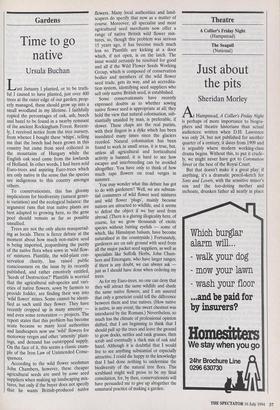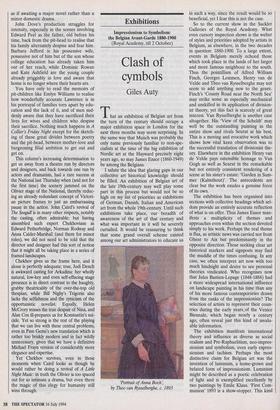Theatre
A Collier's Friday Night (Hampstead) The Seagull (National)
Just about the pits
Sheridan Morley
At Hampstead, A Collier's Friday Night is perhaps of more importance to biogra- phers and theatre historians than actual audiences: written when D.H. Lawrence was only 24, but not published for another quarter of a century, it dates from 1909 and is arguably where modern working-class drama begins. Without this, to put it crude- ly, we might never have got to Coronation Street or the best of the Royal Court.
But that doesn't make it a great play: if anything, it's a dramatic pencil-sketch for Sons and Lovers, with the sensitive miner's son and the too-doting mother and inchoate, drunken father all neatly in place as if awaiting a major novel rather than a minor domestic drama.
John Dove's production struggles for intensity, especially in the scenes involving Edward Peel as the father, old before his time, back from the pit-head to realise that his family alternately despise and fear him. Barbara Jefford is his possessive wife, possessive not of him but of the son whose college education has already taken him out of her reach, while Dominic Rowan and Kate Ashfield are the young couple already priggishly in love and aware that home is no longer where their hearts are.
You have only to read the memoirs of pit-children like Emlyn Williams to realise how wonderfully accurate Lawrence is in his portrayal of families torn apart by edu- cation and the lack of it, and of men sud- denly aware that they have sacrificed their lives for wives and children who despise their sacrifice. Nothing much happens in A Collier's Friday Night except for the sketch- ing of these great divides between poetry and the pit-head, between mother-love and burgeoning filial ambition to get out and get on.
This column's increasing determination to get us away from a theatre run by directors and designers, and back towards one run by actors and dramatists, had a rare success at the National last Thursday when (and not for the first time) the scenery jammed on the Olivier stage of the National, thereby reduc- ing an already redundant concept of Victori- an picture frames to just an embarrassing pause in the action. John Caird's revival of The Seagull is in many other respects, notably the casting, often admirable: but having assembled such expert Chekhovians as Edward Petherbridge, Norman Rodway and Anna Calder-Marshall (and them for minor roles), we did not need to be told that the director and designer had this sort of notion that it might all be taking place in a series of framed landscapes.
Chekhov gives us the frame here, and it alone is perfectly adequate; true, Judi Dench is awkward casting for Arkadina: her wholly natural, low-key and even self-effacing stage presence is in direct contrast to the haughty, grabby theatricality of the over-the-top old thespian, while Bill Nighy's Trigorin also lacks the selfishness and the cynicism of the opportunistic novelist. Equally, Helen McCrory misses the true despair of Nina, and Alan Cox ill-prepares us for Konstantin's sui- cide. Yet so strong is the rest of the playing that we can live with these central problems, even in Pam Gems's new translation which is rather too briskly modern and in fact wildly unnecessary, given that we have a definitive Michael Frayn version of considerably more elegance and expertise.
Yet Chekhov survives, even in those moments when Caird looks as though he would rather be doing a revival of A Little Night Music: in truth the Olivier is too spaced out for so intimate a drama, but even there the magic of this elegy for humanity still wins through.



















































 Previous page
Previous page